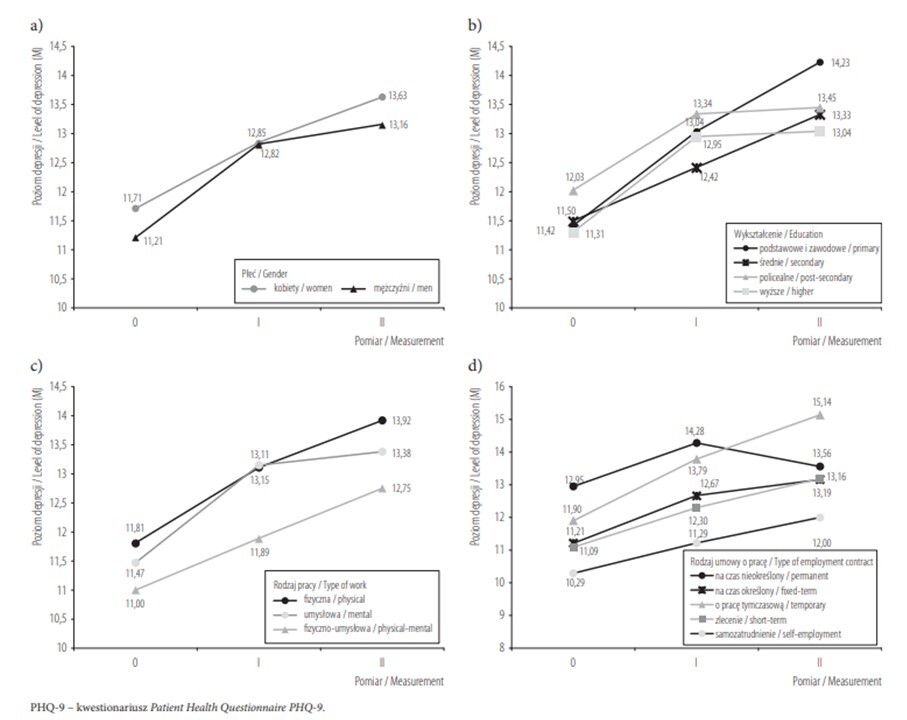Online first
Current issue
Archive
Most cited in 2024
About the Journal
Editorial Office
Editorial Board
Copyright and self-archiving policy
Information clause on the processing of personal data
Declaration of accessibility
Instructions for Authors
Instructions for Reviewers
Contact
Reviewers
2024
2023
2022
2020
2021
2019
2018
2017
2016
2015
2014
2013
Editing and translations
ORIGINAL PAPER
Depressive disorders of working Poles during the COVID-19 pandemic (2019–2022)
1
Centralny Instytut Ochrony Pracy – Państwowy Instytut Badawczy / Central Institute of Labour Protection – National Research Institute, Warsaw, Poland (Zakład Ergonomii / Department of Ergonomics)
Online publication date: 2023-03-02
Corresponding author
Dorota Żołnierczyk-Zreda
Centralny Instytut Ochrony Pracy – Państwowy Instytut Badawczy, Zakład Ergonomii, ul. Czerniakowska 16, 00-701 Warszawa
Centralny Instytut Ochrony Pracy – Państwowy Instytut Badawczy, Zakład Ergonomii, ul. Czerniakowska 16, 00-701 Warszawa
Med Pr Work Health Saf. 2023;74(1):41-51
KEYWORDS
depressive disorderssickness absencedepression preventionthe COVID-19 pandemicemployment contractPHQ-9
TOPICS
ABSTRACT
Background: The problem of the intensification of mental disorders, including depressive disorders, is well documented in the world, but in Poland data on this subject are still insufficient. It can be assumed that the worldwide increase in mental health problems resulting from the outbreak of the COVID-19 pandemic in the winter of 2019 could also change the current statistics with regard to depressive disorders occurring in Poland. Material and Methods: Longitudinal studies diagnosing depressive disorders were carried out on a representative group of 1112 Poles working in various occupations, employed on the basis of various types of employment contracts in the period January–February 2021, and a year later. During the first measurement of depressive disorders, the respondents were also asked to retrospectively assess the severity of these disorders in the early autumn of 2019, i.e., 6 months before the outbreak of the COVID-19 pandemic. Depression was diagnosed using the Patient Health Questionnaire PHQ-9 (PHQ-9). Results: The results of the research presented in the article indicate a significant increase in the level of depression among working Poles in the period 2019–2022, as well as an exacerbation of the severity of its symptoms, probably resulting from the outbreak of the pandemic. However, in the years 2021–2022, a growing level of depression was observed only among working women, less educated people, people engaged in physical and mental work, as well as people with less stable employment (temporary work contracts, specific-task contracts and fixed-term contracts). Conclusions: Due to the high individual, organizational and social costs that generate depressive disorders, there is an urgent need to develop a comprehensive depression prevention strategy, including programs to prevent these disorders in the workplace. This need applies in particular to working women, people with lower social capital and those with less stable type of employment. Med Pr. 2023;74(1):41–51
Share
RELATED ARTICLE
We process personal data collected when visiting the website. The function of obtaining information about users and their behavior is carried out by voluntarily entered information in forms and saving cookies in end devices. Data, including cookies, are used to provide services, improve the user experience and to analyze the traffic in accordance with the Privacy policy. Data are also collected and processed by Google Analytics tool (more).
You can change cookies settings in your browser. Restricted use of cookies in the browser configuration may affect some functionalities of the website.
You can change cookies settings in your browser. Restricted use of cookies in the browser configuration may affect some functionalities of the website.






